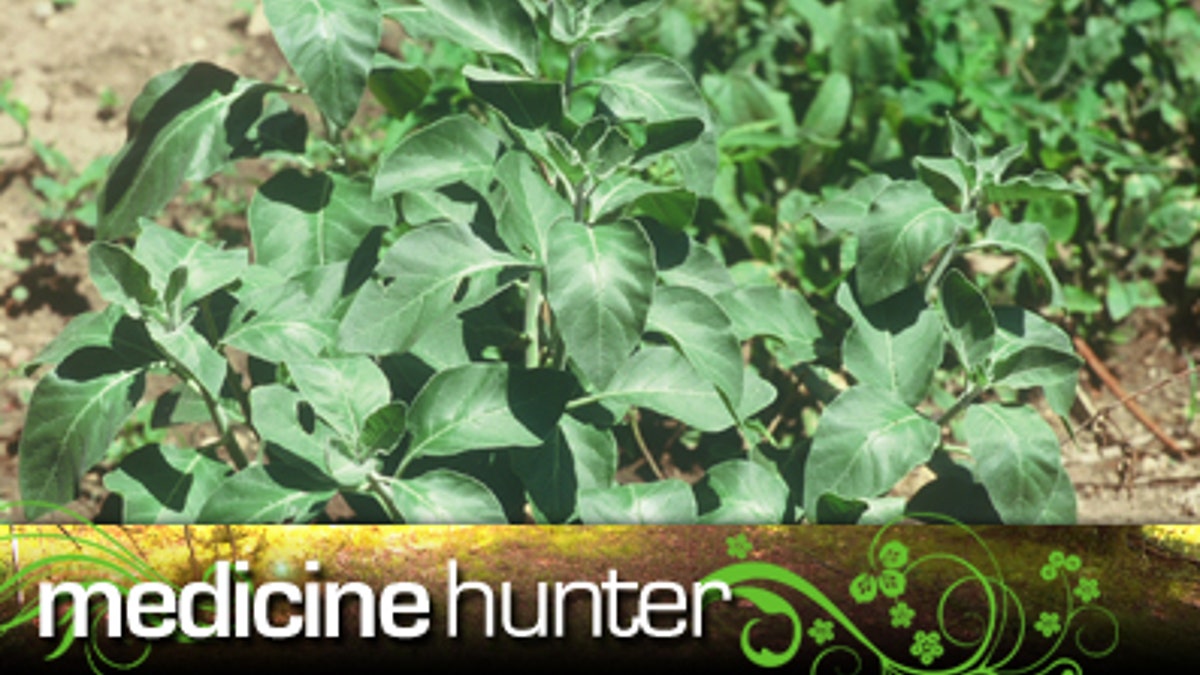
Of all the medicinal plants used in India’s 5,000 year old tradition of ayurveda, ashwagandha, Withania somnifera, is the most highly prized. Use of the root can be traced back as far as 3,000 years. Ashwagandha is classified as a rasayan, a rejuvenating or life extending agent. The rasayan are the most esteemed of ayurveda’s herbs, as they imbue the user with life itself. The root of the plant appears in remedies for cough, rheumatism, gynecological disorders, fatigue, emaciation, inflammation, ulcers, sore eyes, and diminished brain function.
Ashwagandha is also India’s most potent sex-enhancing plant. It is used equally by men and women, and is widely prescribed by physicians to adults with low libido, and to improve sexual function.
A small woody shrub, ashwagandha features elliptical green leaves, small uniform five-petaled flowers, and red seeds. The plant flowers year around. The root of the plant is the prize. A long taproot and a mass of smaller roots held clumps of soil. According to the American Herbal Pharmacopoeia, an acre of cultivated ashwagandha will yield about 500 pounds of root, which when dry reduces to around 150 pounds. It takes a year to bring the plant to maturity. Harvest is usually between January and March. The plant is forgiving too, and requires little attention and no irrigation, even in the parched climate of southern India. Ashwagandha is a strong and vigorous plant, thriving where other plants wither and die.
Researchers throughout India have discovered numerous compounds in ashwagandha. The plant also contains alkaloids such as ashwagandhine, withanine and somniferiene. What accounts for ashwagandha’s seemingly remarkable versatility as a beneficial healer? The plant is rich in potent alkaloids, among which are withamosine, visamine, cuscohygrine, anahygrine, tropine, pseudotropine, anaferine, isopelletierine, and withaferin A. The plant contains a large number of novel compounds known as withanolides, which are novel to the plant and are typically used to standardize the potency of extracts. Whether one or two of these compounds are responsible for the plant’s remarkable health-imbuing versatility, or whether ashwagandha’s value is due to an incredibly complex synergy of all its natural constituents, is a matter which may take a long time to solve by scientific means. According to a large body of research, components in ashwagandha possess tonic, anti-inflammatory, aphrodisiac, immune enhancing, anxiety-relieving and nerve sedative properties.
I would like to say that a plethora of human studies show that ashwagandha is a superior sex-enhancer. As yet there are no studies on this use of ashwagandha. But the root enjoys three thousand years of exactly such an application, by millions of satisfied people. The Indian Materia Medica recommends use of ashwagandha for general debility, impotence, general aphrodisiac purposes, brain fatigue, low sperm count, nervous exhaustion, and in any cases in which general vigor must be restored. For men and women, for the old and the young, ashwagandha builds strength from within. Often, this strength and vitality manifests as newfound or restored sexual vigor and function. One ayurvedic aphrodisiac formula combines one part ashwagandha to ten parts milk and one part ghee (clarified butter). You boil the mixture down until only ghee remains. This end product is called ashwagandha ghrita. You take about a heaping tablespoon of this mixture in the morning and in the evening, and according to ancient texts, you will experience a significant boost in libido and sexual stamina.
Ashwagandha has been studied as an adaptogen, that class of natural plant agents which enhance overall immunity and build non-specific resistance to various stresses. In one human clinical study, ashwagandha improved overall mental aptitude and reaction time.
In animal studies, ashwagandha demonstrates significant stress-fighting power. This is unquestionably the key to the plant’s sex-enhancing powers. Stress factors of all kinds compromise virtually every system of the body, producing stress chemicals which in turn diminish the function of organs and glands. In the domino effect of stress’s ravaging of the human system, fatigue, reduced immunity and sexual debility go hand in hand. The overwhelming stresses of life leave people feeling devitalized. But when you take ashwagandha, that equation begins to turn around. As an adaptogen, the root helps the body to normalize all aspects of healthy function in the face of stress.
Recommendation? I like the ashwagandha tablets made by Himalaya Herbal Co.
Chris Kilham is a medicine hunter who researches natural remedies all over the world, from the Amazon to Siberia. He teaches ethnobotany at the University of Massachusetts Amherst, where he is Explorer In Residence. Chris advises herbal, cosmetic and pharmaceutical companies and is a regular guest on radio and TV programs worldwide. His field research is largely sponsored by Naturex of Avignon, France. Read more at www.MedicineHunter.com








































